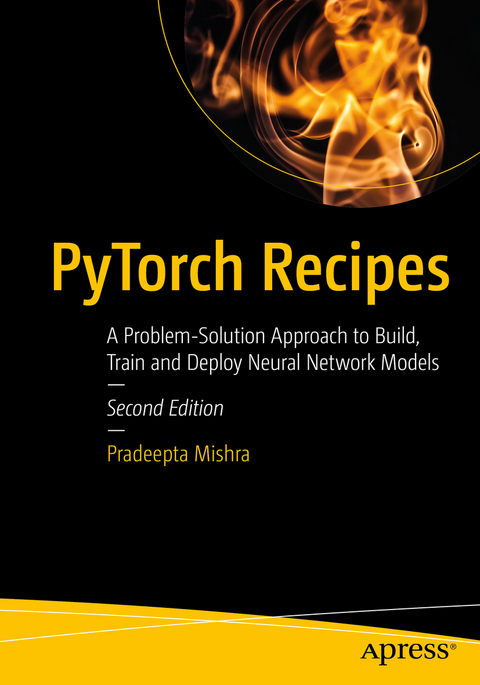
PyTorch Recipes
Apress (Verlag)
978-1-4842-8924-2 (ISBN)
You'll start by learning how to use tensors to develop and fine-tune neural network models and implement deep learning models such as LSTMs, and RNNs. Next, you'll explore probability distribution concepts using PyTorch, as well as supervised and unsupervised algorithms with PyTorch. This is followed by a deep dive on building models with convolutional neural networks, deep neural networks, and recurrent neural networks using PyTorch. This new edition covers also topics such as Scorch, a compatible module equivalent to the Scikit machine learning library, model quantization to reduce parameter size, and preparing a model for deployment within a production system. Distributed parallel processing for balancing PyTorch workloads, using PyTorch for image processing, audio analysis, and model interpretation are also covered in detail. Each chapter includes recipe code snippets to perform specific activities.
By the end of this book, you will be able to confidently build neural network models using PyTorch.
What You Will Learn
Utilize new code snippets and models to train machine learning models using PyTorch
Train deep learning models with fewer and smarter implementations
Explore the PyTorch framework for model explainability and to bring transparency to model interpretation
Build, train, and deploy neural network models designed to scale with PyTorch
Understand best practices for evaluating and fine-tuning models using PyTorch
Use advanced torch features in training deep neural networks
Explore various neural network models using PyTorch
Discover functions compatible with sci-kit learn compatible models
Perform distributed PyTorch training and execution
Who This Book Is ForMachine learning engineers, data scientists and Python programmers and software developers interested in learning the PyTorch framework.
Pradeepta Mishra is the Director of AI, Fosfor at L&T Infotech (LTI), leading a large group of Data Scientists, computational linguistics experts, Machine Learning and Deep Learning experts in building the next-generation product, ‘Leni,’ the world’s first virtual data scientist. He has expertise across core branches of Artificial Intelligence including Autonomous ML and Deep Learning pipelines, ML Ops, Image Processing, Audio Processing, Natural Language Processing (NLP), Natural Language Generation (NLG), design and implementation of expert systems, and personal digital assistants. In 2019 and 2020, he was named one of "India's Top "40Under40DataScientists" by Analytics India Magazine. Two of his books are translated into Chinese and Spanish based on popular demand. He delivered a keynote session at the Global Data Science conference 2018, USA. He has delivered a TEDx talk on "Can Machines Think?", available on the official TEDx YouTube channel. He has mentored more than 2000 data scientists globally. He has delivered 200+ tech talks on data science, ML, DL, NLP, and AI in various Universities, meetups, technical institutions, and community-arranged forums. He is a visiting faculty member to more than 10 universities, where he teaches deep learning and machine learning to professionals, and mentors them in pursuing a rewarding career in Artificial Intelligence.
Chapter 1: Introduction to PyTorch, Tensors, and Tensor Operations.- Chapter 2: Probability Distributions Using PyTorch.- Chapter 3: CNN and RNN Using PyTorch.- Chapter 4: Introduction to Neural Networks Using PyTorch.- Chapter 5: Supervised Learning Using PyTorch.- Chapter 6: Fine-Tuning Deep Learning Models Using PyTorch.- Chapter 7: Natural Language Processing Using PyTorch.- Chapter 8: Distributed PyTorch Modelling, Model Optimization and Deployment.- Chapter 9: Data Augmentation, Feature Engineering and Extractions for Image and Audio.- Chapter 10: PyTorch Model Interpretability and Interface to Sklearn.
“The book covers all important facets of neural network implementation and modeling, and could definitely be useful to students and developers keen for an in-depth look at how to build models using PyTorch, or how to engineer particular neural network features using this platform.” (Mariana Damova, Computing Reviews, July 24, 2023)
| Erscheinungsdatum | 10.12.2022 |
|---|---|
| Zusatzinfo | 20 Illustrations, color; 37 Illustrations, black and white; XXIV, 266 p. 57 illus., 20 illus. in color. |
| Verlagsort | Berkley |
| Sprache | englisch |
| Maße | 178 x 254 mm |
| Themenwelt | Mathematik / Informatik ► Informatik ► Datenbanken |
| Mathematik / Informatik ► Informatik ► Programmiersprachen / -werkzeuge | |
| Informatik ► Theorie / Studium ► Künstliche Intelligenz / Robotik | |
| Mathematik / Informatik ► Mathematik ► Finanz- / Wirtschaftsmathematik | |
| Schlagworte | CNN • Image Processing • Neural networks • Python • PyTorch • RNN • Skorch • supervised learning • Tensors |
| ISBN-10 | 1-4842-8924-2 / 1484289242 |
| ISBN-13 | 978-1-4842-8924-2 / 9781484289242 |
| Zustand | Neuware |
| Informationen gemäß Produktsicherheitsverordnung (GPSR) | |
| Haben Sie eine Frage zum Produkt? |
aus dem Bereich


